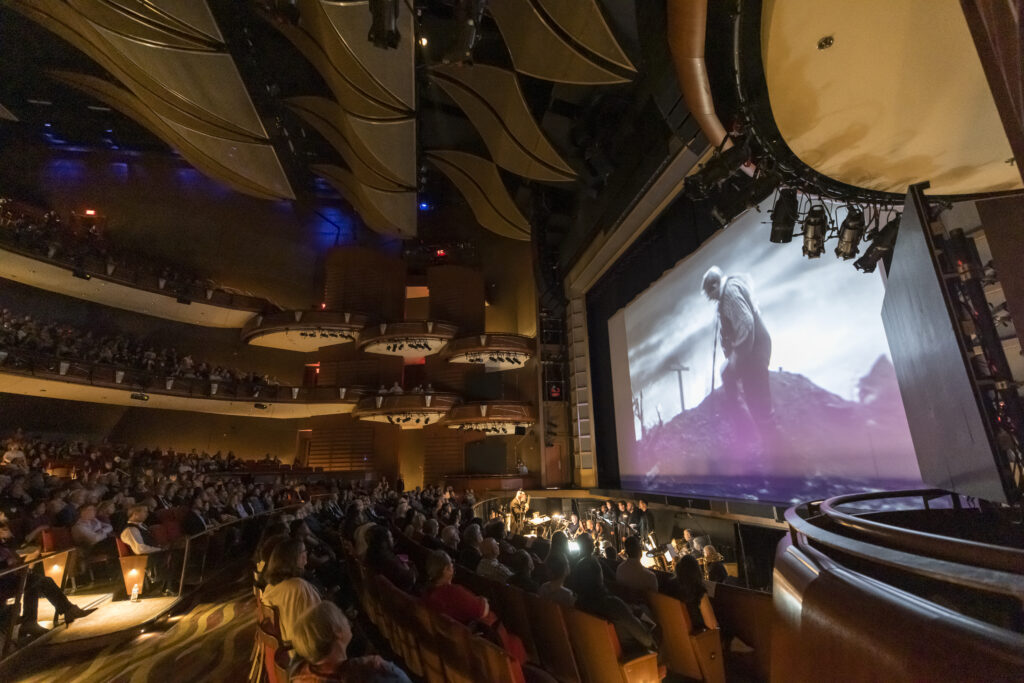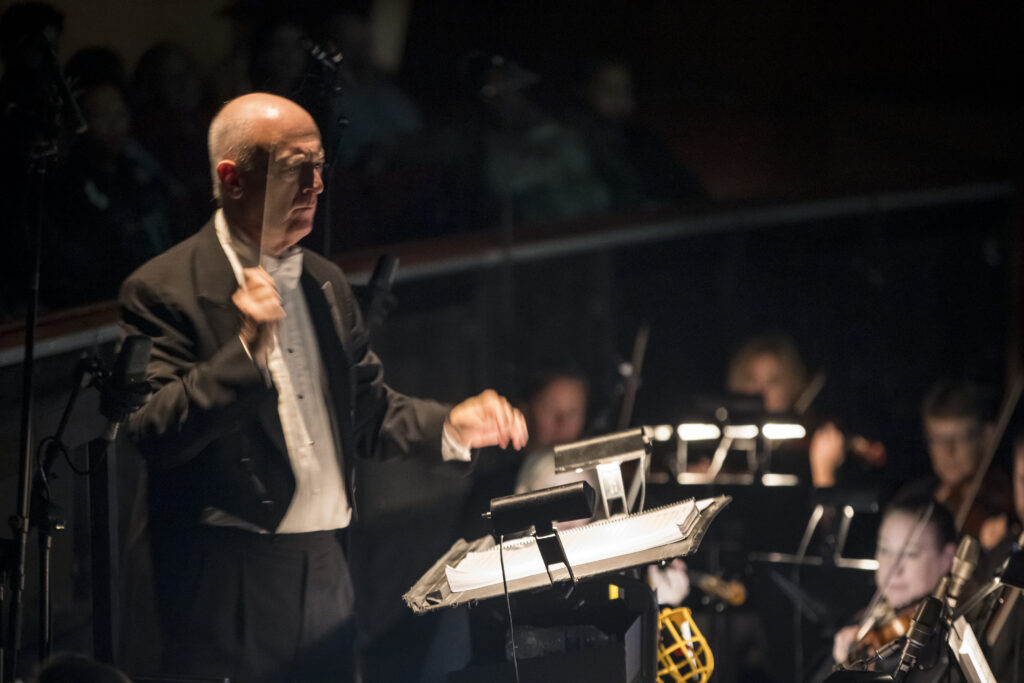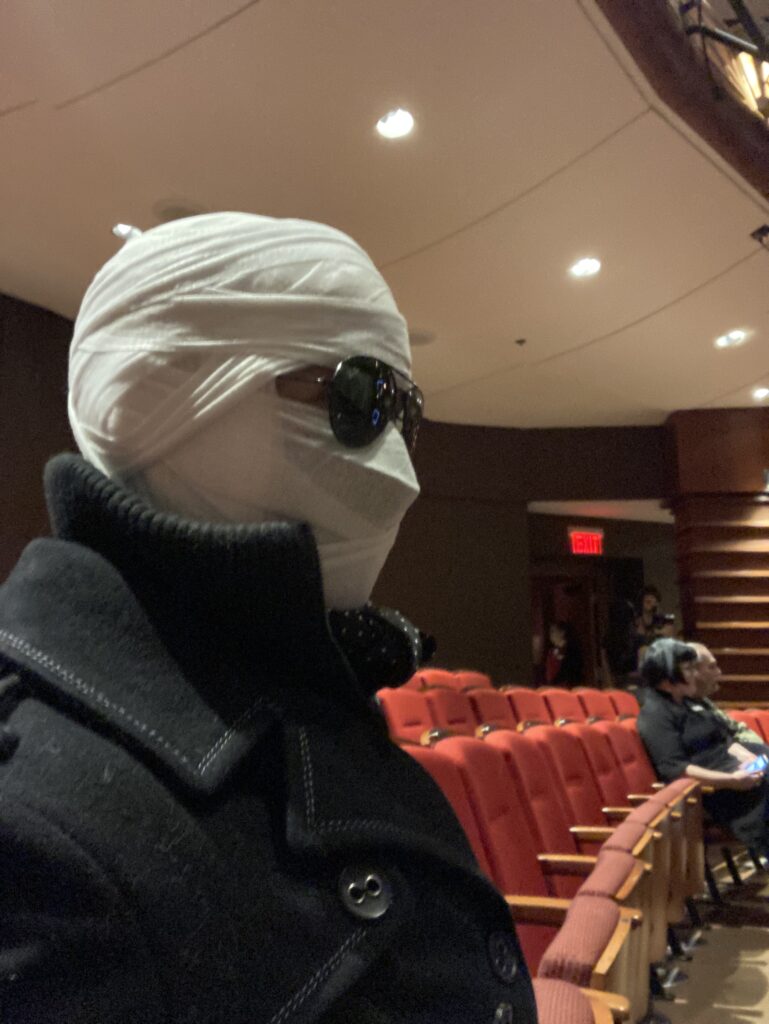Following the success of Moravec’s The Shining, The Atlanta Opera unveiled the next offering in its dark and moody 2023-24 season this past Saturday at the Cobb Energy Center’s stage with the premiere of Michael Shapiro’s Frankenstein: The Movie Opera. Unlike the case of Moravec’s uneven offering, Mr. Shapiro’s Frankenstein is little trick and all treat, ushering all the chills just in time for Halloween.
Influenced by German Expressionism championed by works such as The Cabinet of Dr. Caligari and The Golem, Frankenstein is, like its great German counterpart, a product of post World War trauma. Economic anxiety brought on by the Great Depression, coupled by isolationist fears of all things foreign and unknown, allowed for an exploration of America’s fears through celluloid; now repackaged through the novel talking picture trend that would bury the golden era of silent film (ironically, the monster does not speak in the film, but his starts and fits are well captured). Alongside the other great horror smash of 1931, Tod Browning’s Dracula starring Bela Lugosi, Frankenstein arrived at a time when Universal Pictures needed it most, and similar to how Kirsten Flagstad reportedly saved the Metropolitan Opera’s box office four years later, the films and their subsequent sequels allowed Hollywood to weather the 1930s. Frankenstein also arrived at a time when the infamous Hays Code had yet to be fully established, allowing director James Whalen to imbue the film with important LGBTQIA+ subtexts, which, alongside scenes depicting pedicide, the desecration of corpses, and overt sacrilegious acts, earned the film much controversy and future censorship. Today’s audiences, contending with the likes of the latest Exorcist reboot and whatever the hell The Nun II was – I can’t, y’all – may benefit from a viewing or two of these golden age masterpieces: They were making important art back then.

Photo credit: Raftermen
Stepping of the curmudgeon soap box, I will admit that full acquaintance with the Universal Classic Monsters is a big ask, even for seasoned horror enthusiasts. Frankenstein’s runtime of 71 minutes should appeal to the Tik Tok generation, but the lack of a soundtrack is a deal breaker for many. Enter composer Michael Shapiro, who set his sights in filling the silence by composing a movie score to play alongside the film’s dialogue. Since its debut in 2002 at the Film Society of Lincoln Center’s Jacob Burns Film Center, his work has received critical praise in its frequent stagings, and encouraged Mr. Shapiro to debut a vocal version of the score at LA Opera last year. Refashioned with elements of the Latin Requiem Mass, this vocal version, renamed “Frankenstein, The Movie Opera”, had its East Coast premiere at the Atlanta Opera this past Saturday.
The label of “Movie Opera” is somewhat misleading as the soloists, made up of artists from The Atlanta Opera Glynn Studio (Amanda Sheriff, Aubrey Odle, Kameron Lopreore, Jason Zacher) and baritone Andrew Gilstrap, do not engage with each other as avatars to the actors onstage as one would expect. Rather, Mr. Shapiro has elected to keep the actors’ spoken dialogue intact while the soloists react to the themes explored by the film in a manner similar to the way a film score like Jerry Goldsmith’s for The Omen functions. Through various leitmotifs (a haunting Dies Irae accompanies the monster’s darkest scenes,) Mr. Shapiro’s score maintains a pervasive feeling of elemental alarm as the proceedings unfold.

Photo credit: Raftermen.
Past this generalized support, the score is hardly ever descriptive, and as the film unfolds, the score may strike the ear as a bit repetitive. Oddly, this is perhaps its greatest strength, for it succeeds in beautifully enhancing this iconic classic with the musical support it needs to promote its great qualities to generations groomed away from the values its charms are built upon. By sticking to a limited assortment of devices, Mr. Shapiro’s music lacks that self-serving element that often limits the public’s will to embrace modern scores, particularly those associated with the lyric stage. Essentially, he keeps the audience engaged without calling too much attention to himself. In most instances, he wisely avoids interfering with Colin Clive’s and Boris Karloff’s extraordinary performances, and certainly keeps out of James Whalen’s way. His restraint betrays his love and respect for the film, though I noted that he couldn’t fully help himself during the scene depicting the monster’s encounter with sunlight for the first time. This is truly the scene where Karloff’s profound portrayal casts the dye for both creature and the audience’s relationship to it, acknowledged here with touching subtlety by Mr. Shapiro.

The one night only event, cleverly billed as part of a Halloween-themed season, promoted an atmosphere of whimsy throughout the venue, and many a patron sporting full costume could be spotted in every row. Even the Invisible Man made an appearance – if you managed to see him at all, of course.
The Atlanta Opera 2023-24 season creeps into its mainstage opener this Saturday with a new production of Verdi’s immortal masterpiece Rigoletto. For more information on the company’s exciting season (La Boheme, A Midsummer Night’s Dream and Die Walkure will soon follow) please visit www.atlantaopera.org
-Daniel Vasquez